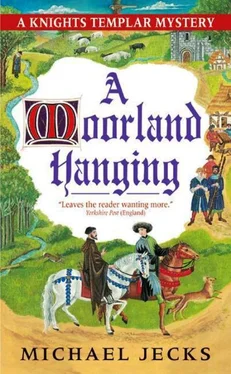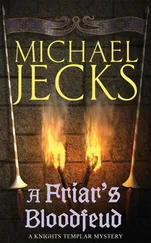For some time he sat watching the vill, frowning. The bailiff and his friend had been gone for too long: it was not his imagination, the sun cast strong shadows in this light, and he had watched his own move over a heather bush and on. John sat moodily on his horse beside him, while Sir Ralph gazed down at the camp with a kind of tranquil boredom, as if in this wasteland there was nothing else to hold his attention. When he heard a horse snort loudly, Sir William glanced over his shoulder at the man behind, and saw there too that he had the same quiet stillness. Few looked at him; their eyes were all fixed on the camp.
He had never expected to ride out again at his time of life. Seeing his men, all the guards from the fort and the servants who could ride, he felt a curious sensation that this was all wrong. It should not be him here, it should be one of his sons leading the men. He was too old. His time had passed, even as the old King’s had, with the fierce and brutal clashes in Wales over thirty years ago. Then he had been young and eager, a forceful leader of men, a man of honor with other renowned names at his side.
They were good days. The risks had been high, the plunder great, and for all the men who survived there was a feeling of achievement and pride. Even after the debacle of the expedition from Anglesey the tall man from Beauscyr had taken a good portion of the spoils for himself.
A quick frown darkened his brow as he thought again of the short, dark man with the flinty eyes who had been in his company, who had stood apart from the others and fought alone, as if he was no part of the rest of the group but an outsider who had joined merely to offer assistance when needed. Now this same man Thomas Smyth had caught his son, thirty years on, and for no reason.
Whirling his horse round, he motioned to a man nearby. “Take a message to the others,” he said, issuing instructions quickly and sending him on his way. His eyes stayed fixed on the rider as he galloped up the hill and disappeared over the other side, then he glanced at his son. “Come, John. Let’s free your brother.”
Simon and Baldwin watched grimly as men poured over the brow of the hill and walked, a straggling mass, toward the vill. From his place behind his master, Edgar could see some of the defenses prepared for them. True, there was no high rampart or wall like that at Beauscyr, but all over the camp large rocks had been scattered, making it harder for horses to travel fast, and these, along with the holes dug out on the plain, should stop any charge. The miners stood in small groups, with outlying men at each side who carried bows, while in the middle was the greater force of men with arms, holding swords, picks and iron bars in fists gone suddenly clammy.
Thomas Smyth strode around, offering brief words of support and encouragement, laughing at the words of one, slapping another on the back, and experimentally touching a rusty weapon here and there with a show of amused disgust. To Baldwin he was like any number of men who led others, smiling, instilling confidence by his own display, and always remembering the names of his men. Like all good commanders, he knew, the knight could see that if a man would fight and die for his master, that master must show respect for his man. And like all good commanders, he knew how to position his troops for best advantage.
Chewing at his moustache, Baldwin tried twice to go to the miner, but now George Harang had his sword out and was guarding the two men and their servants with five others. His eyes never left the bailiff and his friend, not even when the shout went up from the Beauscyr force, not when the stumbling feet began to stamp and pound as they ran toward the camp, their steps sounding like a rushing river of noise. For all that, it was strangely peaceful. A lark sang above the camp, the murmur of the leat called softly behind the blowing-house, and Baldwin had a sense of unreality. It felt impossible that he was truly here, and would shortly witness the climax of years of arguing between the tinners and the landlord, that he would again be involved in a battle in which he had no part. He had no interest in either side’s claims or demands, he was only here to help his friend try to find justice for a man who had been captured.
The running men had lost any semblance of formation now, and he could not help his lip curling in disgust, quickly replaced by sympathy. These men were just like the troops he had seen at Acre. Poor, untrained levies hurled at the enemy to try to batter a way through while the cavalry searched for the best point to smash a breach in the lines. Like at Acre, they would be destroyed. Here, there was no line to be broken, no defense where cavalry could focus. When he heard the whistle and snap of the bows, he winced, and had to turn away, but not before he had seen men stumble and fall, two with the feathered darts jutting obscenely from their chests, one with a shaft embedded in his throat. Another wave of arrows rose into the air, sounding like a flock of geese in their hollow swishing, and the solid thump as they hit flesh was a terrible sound.
But he had not realized how well Sir William had been trained. As the torrent of men reached the camp, almost simultaneously, or so it seemed, there was a great shout behind. A strong party of horsemen had ridden round and were now attacking from across the river, behind the defenders. The call acted like spurs to the Beauscyr men in front, and their weapons rose and fell, swords meeting axes, pikes meeting hammers, daggers meeting daggers, in a cacophony of discordant clanging like an army of ironsmiths beating their anvils together.
And now there was a fresh rumbling and pounding as the knight led his men at the gallop. Baldwin could see the two men leading, Sir William Beauscyr and Sir Ralph, their swords high, the sun sparkling on their mail and plate, glinting from their swords as they whirled overhead, flashing from the sharp edges of the lances, while the land shimmered under the thunder of the hooves. When they came upon the pot-holed ground, many fell, but most reached the edge of the little town.
Simon was fretting. He did not know what to do for the best. It was impossible to stop the brawl, but he could not stand by and see so many men killed or wounded for no reason without lifting a finger. George Harang and his men anxiously fingered their weapons and cast wary glances over the two men. Thomas Smyth had not asked Simon or Baldwin for their swords or daggers, but neither felt it would be safe to draw them. The miners had no reason to feel that they were enemies as yet, and both men would prefer matters to stay that way.
Between the cottages Simon caught occasional glimpses of the struggling men. He winced as he saw an axe fall and take a man’s arm off at the shoulder. There was a short wail, swiftly cut off, and he spun round to see a man sinking to his knees with a bloody mess where his throat should have been. Suddenly he felt waves of nausea breaking over him, and he gasped, his eyes still on the man who slowly toppled to one side, eyes wide and staring as if in surprise.
That was when his anger flashed into full flame. Shoving one guard away, he snarled at George Harang: “Take me to Smyth!”
The miner gazed at him uncertainly. “I was told to keep you here.”
“I don’t care! How many more must die while those two fools fight with other men’s lives? Take me to him now! This isn’t just madness, it’s futile!”
George hovered, undecided. Thomas had told him to stay here with the two men, but he, too, was shocked by the brutality of the battle. This was not what he had expected. It was no way to avenge Peter – it was merely a slogging match in which men with the least reason to fight were pitted against each other. Yet slowly, unwillingly, he shook his head. He had never yet failed his master.
Читать дальше












